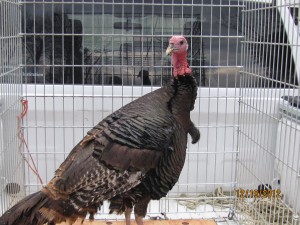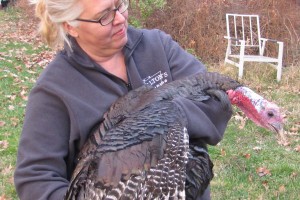by Kristen Minogue

A white pickup truck prepares to carry Tuck to a nearby farm. Tuck, a bronze heritage turkey, was discovered wandering alone on SERC property last week. His friendliness around people made staff suspect he was an abandoned pet. (Marvin Dorsey)
The following is a true story about how not to break up with a pet. Tuck (left) is a domestic turkey who found himself alone in the woods, presumably abandoned by his keeper and half-starved when SERC security discovered him last Thursday.
It’s not uncommon to hear about pets left on the sides of streets or in vacant houses when their owners, for one reason or another, decide they’re no longer able to keep them. These stories usually involve dogs, cats or the occasional boa constrictor. In their defense, some owners may believe their pets will be able to fend for themselves in the wild. The owner who dropped off Tuck may have been operating under a similar assumption. Unfortunately the assumption is almost always false.
Anatomically, Tuck might have stood a fighting chance. His wings, tail and spurs weren’t clipped–a common practice among many farmers who try to keep turkeys in pens–though they were a bit worn from wear. But behaviorally he was doomed from the beginning. The food-gathering skills of any domesticated animal largely consist of begging. So, when left on his own to wander the forests, he didn’t look for other wild animals of his kind. Instead he sought out the animals he was most accustomed to: people.
He found them at the green security booth, less than half a mile past the SERC entrance. The officers who ran into him reported that the turkey was very friendly and ravenously hungry. At one point a guard offered the bird Cheetos, which he accepted with no apparent reservations. Eventually someone thought to alert Karen McDonald, one of SERC’s education and outreach coordinators, in the hope that she could find him a safer place where he would not have to rely on vending machine snacks for his daily sustenance.
“The bird was underweight. It was starving, and it needed a new home,” she said.
However, the trick was finding a home that would not love to have him for dinner. In that Tuck had his breeding working against him. Tuck is a heritage turkey, a variety with less meat than the more common butterball turkey, but thought by many to possess a superior flavor. Heritage turkeys are also much more difficult to find, with some families ordering theirs months before Thanksgiving. So it’s not surprising that turkey connoisseurs would consider Tuck a valuable prize. In searching for potential owners, Ms. McDonald and security Lieutenant Marvin Dorsey also were anxious to avoid taxidermists who would love him as a wall decoration.
Over the weekend Lieutenant Dorsey found a prospect in a local waterman. The waterman had another turkey in his home, and he intended to use both for educational purposes. But they hit a snag: The waterman needed a permit to raise a wild turkey. His first turkey had been born domestic. But Tuck’s origins were a mystery. He could, despite his complete inability to fend for himself, be classified as “wild.” So Lieutenant Dorsey became the bird’s interim guardian and the one who christened him Tuck.

Val Bolger holds the newly adopted Tuck before taking him to her farm. She hopes in a few months he may start mating with the farm’s female turkey, a lonely Bourbon Red. (Marvin Dorsey)
Salvation ultimately came from one of Ms. McDonald’s volunteers, former homeschool parent Val Bolger. Ms. Bolger owns a farm a few miles from the campus. She has another heritage turkey like Tuck, an as-yet unnamed female Bourbon Red, whom she suspects is lonely and possibly confused. “She thinks she’s a goat or a horse. She likes to walk around with the other animals,” she said. But mating season is approaching, and having a male turkey around could ease some of the anticipated barnyard tension.
Ms. Bolger brought Tuck to her farm Wednesday afternoon. The two birds have not been officially introduced, as Tuck is still living in a separate pen. It’s a necessary precaution for the first few days in case he is carrying parasites, she explained. Also, throwing two strange turkeys in the same space and expecting them not to fight is generally unwise. At the moment they can see each other through the fence, but they cannot touch.
For now at least, Tuck seems to have found a happy ending. But there are less traumatic ways to resolve pet-owner conflicts. In an ideal world, owners would make sure they’re able to care for their pets over the long haul before acquiring them. If a pet is already in residence and the relationship is just not working out (turkeys are not the easiest animals to have around the house), look for another keeper who can care for it properly. Wilderness preserves usually don’t make good homes for animals used to having their meals brought to them. Rescue stories do happen—but they’re rare.


A very happy ending to a story that could have otherwise been sad. Many thanks to the SERC staff who worked hard to find “Tuck” his new home!
What a great story, and I love to see happy endings like this. It’s sad to see so many people take on the responsibility of pet ownership without being prepared. I see it all the time in my work. And that’s just with cats and dogs. Dogs, mostly. Turkeys have to be a lot more labor intensive.